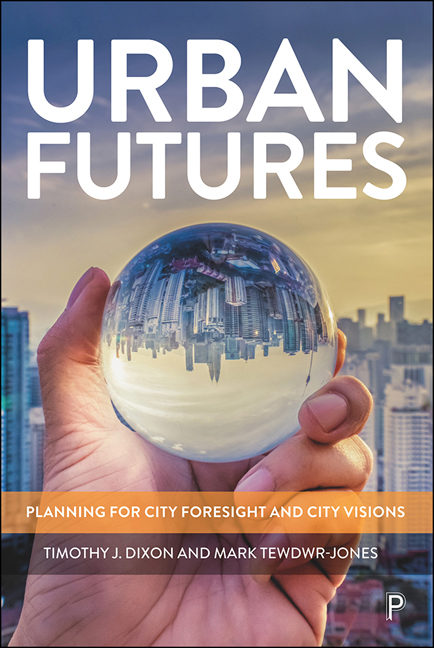Book contents
- Frontmatter
- Contents
- List of figures, tables and boxes
- Acknowledgements
- Foreword
- Preface
- 1 Urban futures: planning for city foresight and city visions
- 2 Cities and integrated urban challenges
- 3 Reimagining the city: views of the future from the past and present
- 4 Planning and governing the future city
- 5 Future narratives for the city: smart and sustainable?
- 6 Theoretical approaches to urban futures
- 7 Using city foresight methods to develop city visions
- 8 Shaping the future: city vision case studies
- 9 The innovative and experimental city
- 10 Visioning and planning the city in an urban age: a reality check
- 11 Conclusions: facing the urban future to 2050 and beyond
- Appendix: selected examples of city visions
- Notes
- References
- Index
7 - Using city foresight methods to develop city visions
Published online by Cambridge University Press: 21 December 2021
- Frontmatter
- Contents
- List of figures, tables and boxes
- Acknowledgements
- Foreword
- Preface
- 1 Urban futures: planning for city foresight and city visions
- 2 Cities and integrated urban challenges
- 3 Reimagining the city: views of the future from the past and present
- 4 Planning and governing the future city
- 5 Future narratives for the city: smart and sustainable?
- 6 Theoretical approaches to urban futures
- 7 Using city foresight methods to develop city visions
- 8 Shaping the future: city vision case studies
- 9 The innovative and experimental city
- 10 Visioning and planning the city in an urban age: a reality check
- 11 Conclusions: facing the urban future to 2050 and beyond
- Appendix: selected examples of city visions
- Notes
- References
- Index
Summary
Think well to the end and consider the end first.
Leonardo da VinciIntroduction and background
In the previous chapters of this book, we have seen, in an increasingly urbanised world, how our perspectives of cities and the narratives we deploy to explain them have shifted, morphed and evolved over time. Cities are hugely important today and have through many centuries led to diverse and rich explorations of idealised futures through art, literature and film. This has led to visionaries in planning and architecture framing new futures for our cities and, as climate change and environmental issues become important in a pervasive digitised and globalised world, the concepts of ‘smart cities’ and ‘sustainable cities’ have found growing interest across the world.
However, if cities and the people who live, work and play in them are to have a say in both how the urban future unfolds and what our real-world cities should look like in 2050 and beyond, then we need to understand the processes by which this could be achieved. The next two chapters are designed to offer a practical guide on how city visions can be developed through participatory-based foresight methods, and how new projects and experiments can help to transform cities and lead to a sustainable (and smart) future. This is a fundamental part of what we term ‘urban futures’ and recognises complexity and the need to manage a transition to a shared and desirable future.
In this chapter, we will look in more detail therefore at what city foresight really means in practice, how we define a ‘city vision’ and how such a vision can be developed with a range of techniques, including visioning and backcasting. To do this, we draw on our own research, working on Reading 2050 and Newcastle 2065 city visioning projects, but we also examine other examples of how foresight activities can help frame city visions in different contexts internationally.
What is city foresight?
As we saw in the earlier part of this book (Chapters 1 and 3), futures thinking is a way of identifying the long-term issues and challenges affecting and shaping the future development of a policy area and enabling the exploration of the implications for policy development (GOfS, 2016a).
- Type
- Chapter
- Information
- Urban FuturesPlanning for City Foresight and City Visions, pp. 123 - 152Publisher: Bristol University PressPrint publication year: 2021



